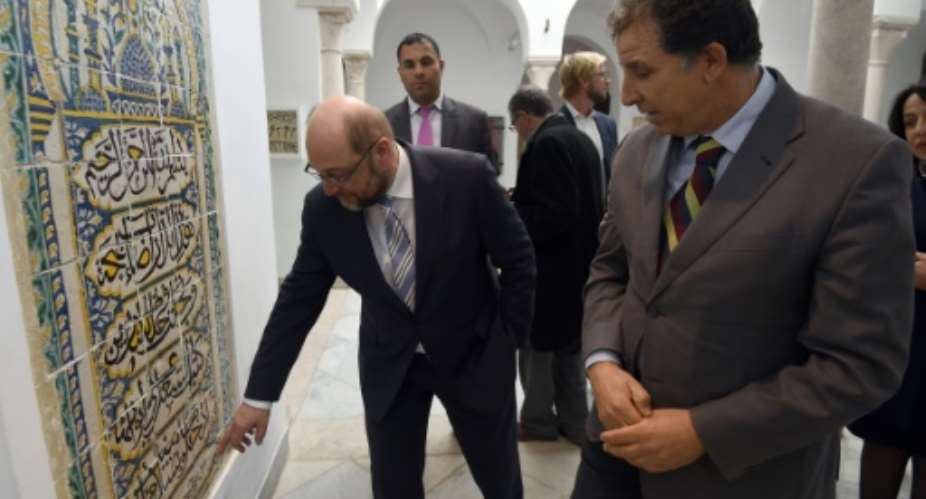Tunis (AFP) - European Parliament President Martin Schulz said in Tunis on Monday that both the EU and North Africa stand to gain from a stable Libya.
"A stable Libya is in the interests of the whole of the Maghreb and the whole of Europe," he said in a speech to the Tunisian parliament, calling for the formation of a Libyan unity government.
Schulz said Europe was aware of the "economic, social and security consequences of insecurity in Libya on civil order and economic growth for you and your neighbours".
Europe and Libya's neighbours have stepped up pressure on the country's rival administrations to fall in line with a UN-brokered peace deal that calls for the formation of a national unity government that would curb inroads made by the Islamic State jihadist group.
Tunisia on Saturday completed the construction of a barrier along its border with Libya, months after jihadist attacks on its national museum and a beach resort that killed dozens of tourists.
Schulz, at the start of a three-day visit, praised the "democratic advances written into" Tunisia's new constitution at a time when it is faced with economic, social and security woes.
Tunisian citizens must "feel the reforms in their daily lives and see the difference" from the situation that existed before the country's 2011 revolution that ousted longtime dictator Zine El Abidine Ben Ali he said.
Schulz warned the Tunisian leadership "not to fall into the trap" of putting security as their sole priority because of concerns over terrorism.
On Tuesday, he is to visit the Sousse coastal region where an IS-claimed attack last June killed 38 foreign tourists, including 30 Britons.





 Akufo-Addo commissions Phase II of Kaleo solar power plant
Akufo-Addo commissions Phase II of Kaleo solar power plant
 NDC panics over Bawumia’s visit to Pope Francis
NDC panics over Bawumia’s visit to Pope Francis
 EC blasts Mahama over “false” claims on recruitment of Returning Officers
EC blasts Mahama over “false” claims on recruitment of Returning Officers
 Lands Minister gives ultimatum to Future Global Resources to revamp Prestea/Bogo...
Lands Minister gives ultimatum to Future Global Resources to revamp Prestea/Bogo...
 Wa Naa appeals to Akufo-Addo to audit state lands in Wa
Wa Naa appeals to Akufo-Addo to audit state lands in Wa
 Prof Opoku-Agyemang misunderstood Bawumia’s ‘driver mate’ analogy – Miracles Abo...
Prof Opoku-Agyemang misunderstood Bawumia’s ‘driver mate’ analogy – Miracles Abo...
 EU confident Ghana will not sign Anti-LGBTQI Bill
EU confident Ghana will not sign Anti-LGBTQI Bill
 Suspend implementation of Planting for Food and Jobs for 2024 - Stakeholders
Suspend implementation of Planting for Food and Jobs for 2024 - Stakeholders
 Tema West Municipal Assembly gets Ghana's First Female Aircraft Marshaller as ne...
Tema West Municipal Assembly gets Ghana's First Female Aircraft Marshaller as ne...
 Dumsor is affecting us double, release timetable – Disability Federation to ECG
Dumsor is affecting us double, release timetable – Disability Federation to ECG
